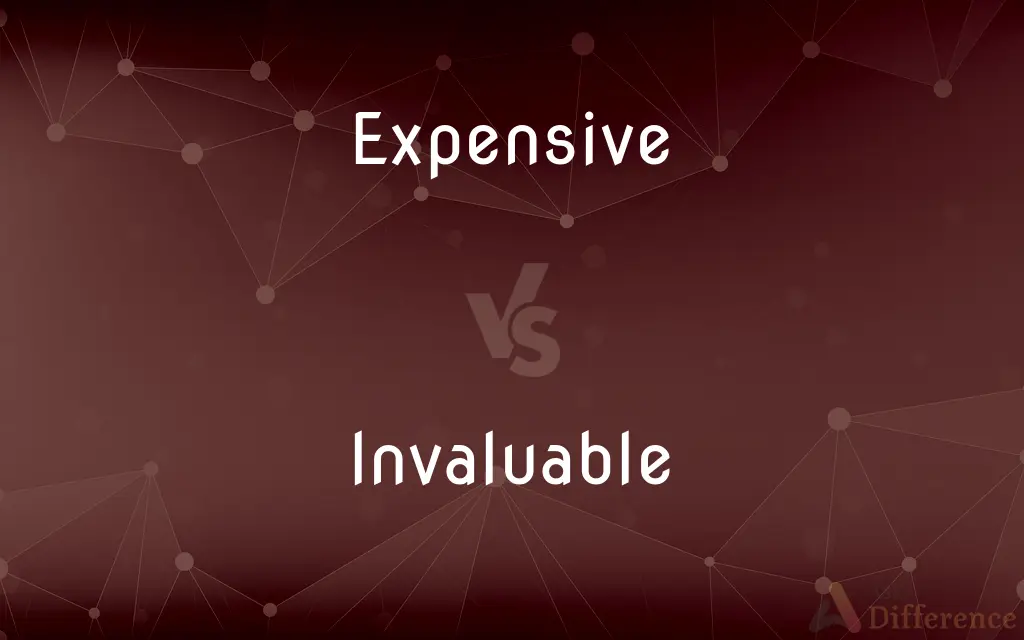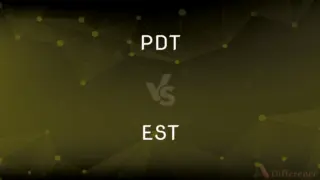Expensive vs. Invaluable — What's the Difference?
Edited by Tayyaba Rehman — By Fiza Rafique — Published on December 21, 2023
Expensive means costing a lot of money, while Invaluable implies something is so precious that its value cannot be determined or is priceless.

Difference Between Expensive and Invaluable
Table of Contents
ADVERTISEMENT
Key Differences
Expensive and Invaluable are both terms used to describe the value or worth of something. However, while Expensive refers to items that come with a high monetary cost, Invaluable describes items whose worth cannot be quantified in monetary terms because of their significance.
It's entirely possible for an item to be both Expensive and Invaluable. For instance, a rare piece of artwork might be Expensive due to its market value, but for someone who appreciates its history and artistic merit, it may also be Invaluable.
On the other hand, some things can be Invaluable without being Expensive. A handwritten letter from a loved one, a family heirloom, or a photograph might not have significant monetary value, but they could hold sentimental value, making them Invaluable to an individual.
Conversely, many items in our daily lives might be Expensive but not Invaluable. Designer clothing or luxury cars may cost a lot but might not hold immeasurable value beyond their price tag. It's crucial to differentiate between the financial worth (Expensive) and the immeasurable significance (Invaluable) of items or experiences.
In essence, Expensive deals directly with the monetary aspect of value, indicating a high price point. In contrast, Invaluable goes beyond money, pointing to something's irreplaceable or incomparable worth, often rooted in personal or historical significance.
ADVERTISEMENT
Comparison Chart
Definition
Costing a lot of money
Having immeasurable value
Relationship with Money
Directly related to monetary value
Not necessarily tied to monetary value
Potential for Overlap
Can be both Expensive and Invaluable
Can be Invaluable without being Expensive
Usage in Sentiment
Often used in neutral or negative contexts
Typically used in positive or sentimental contexts
Typical Contexts
Goods, services, purchases
Memories, experiences, heirlooms, and priceless artifacts
Compare with Definitions
Expensive
Costing a lot of money.
The diamond necklace was Expensive.
Invaluable
Having worth that cannot be expressed in monetary terms.
The vintage photographs are Invaluable to our family history.
Expensive
High in cost or worth.
This restaurant is known for its Expensive wines.
Invaluable
Essential and irreplaceable.
His expertise was Invaluable to the project.
Expensive
Causing a significant reduction in resources.
Repairing the damages was an Expensive endeavor.
Invaluable
Priceless or of incalculable worth.
The artifact is Invaluable to the museum collection.
Expensive
Priced higher than similar items.
Brand-name drugs are usually more Expensive.
Invaluable
Beyond calculable or appraisable value.
Her advice during that difficult time was Invaluable.
Expensive
Having qualities that justify a high price.
The Expensive fabric was soft and durable.
Invaluable
Of tremendous usefulness or importance.
Her feedback proved to be Invaluable for the book's final draft.
Expensive
Requiring a large expenditure; costly.
Invaluable
Of inestimable value; priceless
Invaluable paintings.
Invaluable help.
Expensive
Marked by high prices
Expensive stores.
Invaluable
Having great or incalculable value.
Expensive
(obsolete) Given to expending a lot of money; profligate, lavish.
Invaluable
(obsolete) Not valuable; worthless.
Expensive
Having a high price or cost.
Invaluable
Valuable beyond estimation; inestimable; priceless; precious.
Expensive
(computing) Taking a lot of system time or resources.
An unnecessarily expensive choice of algorithm
Invaluable
Having incalculable monetary worth
Expensive
Occasioning expense; calling for liberal outlay; costly; dear; liberal; as, expensive dress; an expensive house or family.
War is expensive, and peace desirable.
Expensive
Free in expending; very liberal; especially, in a bad sense: extravagant; lavish.
An active, expensive, indefatigable goodness.
The idle and expensive are dangerous.
Expensive
High in price or charging high prices;
Expensive clothes
An expensive shop
Common Curiosities
Can memories be considered Invaluable?
Yes, memories can be Invaluable because of their personal significance.
Does Expensive always mean something is of high quality?
No, Expensive only indicates a high monetary cost, not necessarily quality.
Is Invaluable always positive?
Typically, yes. It denotes something of immeasurable value or significance.
Are all luxury goods Expensive?
Generally, yes. Luxury goods are typically priced higher than standard goods.
Are family heirlooms typically considered Invaluable?
Often, yes. Heirlooms may hold sentimental value, making them Invaluable to family members.
Can something be both Expensive and Invaluable?
Yes, like a rare piece of art that's also sentimentally precious.
Are all Invaluable things also Expensive?
No, some Invaluable items may have little to no monetary value.
What might make a product Expensive?
Factors like brand, quality, rarity, or demand can make a product Expensive.
Can experiences be Invaluable?
Absolutely. Many consider experiences, like time with loved ones, to be Invaluable.
Can skills or knowledge be Invaluable?
Yes, certain expertise or knowledge can be Invaluable in specific contexts.
What's the opposite of Expensive?
Cheap or affordable are opposites of Expensive.
Is Invaluable the same as valuable?
No, while both indicate value, Invaluable suggests immeasurable or priceless value.
Can time be considered Invaluable?
Yes, many believe time is Invaluable because it's irreplaceable.
Do Expensive things always appreciate in value?
No, not all Expensive items appreciate; some might depreciate over time.
Is an Invaluable opinion always correct?
No, but it's deemed highly valuable or significant.
Share Your Discovery

Previous Comparison
PDT vs. EST
Next Comparison
SN1 vs. SN2Author Spotlight
Written by
Fiza RafiqueFiza Rafique is a skilled content writer at AskDifference.com, where she meticulously refines and enhances written pieces. Drawing from her vast editorial expertise, Fiza ensures clarity, accuracy, and precision in every article. Passionate about language, she continually seeks to elevate the quality of content for readers worldwide.
Edited by
Tayyaba RehmanTayyaba Rehman is a distinguished writer, currently serving as a primary contributor to askdifference.com. As a researcher in semantics and etymology, Tayyaba's passion for the complexity of languages and their distinctions has found a perfect home on the platform. Tayyaba delves into the intricacies of language, distinguishing between commonly confused words and phrases, thereby providing clarity for readers worldwide.













































